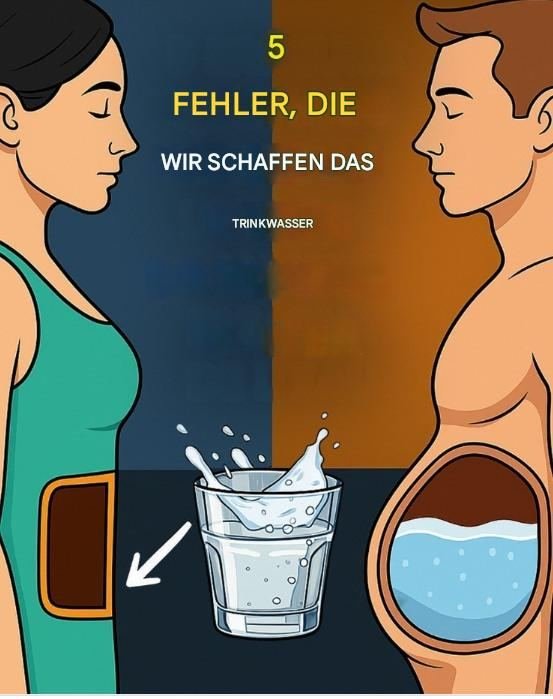Drinking water might seem like a simple and instinctive task, but many of us make small mistakes that can affect our hydration and overall health. Here are five common mistakes people make when drinking water:
1. Drinking Too Much Water at Once
Mistake: Trying to drink a large amount of water in one sitting, often after feeling very thirsty, can put unnecessary strain on the body.
Why it’s a mistake:
-
When you consume a large amount of water rapidly, your kidneys can become overwhelmed and may not be able to process it fast enough.
-
This can lead to water intoxication (also known as water poisoning or hyponatremia), a rare but serious condition where the balance of electrolytes in the body becomes diluted, causing symptoms like nausea, headaches, confusion, and even seizures.
How to avoid it:
-
Drink small amounts of water consistently throughout the day to keep hydration levels stable, rather than chugging large quantities at once.
2. Drinking Water Immediately After Meals
Mistake: Many people drink water immediately after meals, believing it aids digestion.
Why it’s a mistake:
-
Drinking too much water right after eating can dilute digestive enzymes and stomach acids, impairing digestion.
-
This can lead to bloating, indigestion, or an uncomfortable feeling of fullness.
-
Excessive water can slow down the digestion process, making it harder for the body to absorb nutrients effectively.
How to avoid it:
-
Wait at least 30 minutes to an hour after eating before drinking large amounts of water. A small sip of water here and there is okay, but it’s best to avoid gulping down too much liquid immediately after meals.
3. Drinking Water That’s Too Cold
Mistake: Drinking ice-cold water, especially during or after meals.
Why it’s a mistake:
-
Extremely cold water can shock the digestive system, constrict blood vessels, and potentially slow down the digestive process.
-
Cold water may also irritate the throat and could even contribute to gastritis or bloating in sensitive individuals.
-
Additionally, ice-cold water can be uncomfortable to drink in large amounts, causing the body to “shut down” and not absorb water efficiently.
How to avoid it:
-
Opt for room temperature or slightly cool water for better hydration, particularly if you’re drinking around meal times or after exercise.
4. Not Drinking Enough Water
Mistake: Skipping water throughout the day, either by forgetting to drink it or opting for caffeinated or sugary drinks instead.
Why it’s a mistake:
-
Dehydration is a common problem that many people don’t recognize until it’s already affecting their health. Symptoms can include fatigue, headaches, dizziness, dry skin, and trouble concentrating.
-
Caffeinated beverages or sugary drinks like soda and juice might provide a temporary sense of relief but don’t hydrate the body in the same way that water does. They can also contribute to dehydration in some cases (especially caffeine).
How to avoid it:
-
Try to set reminders or make it a habit to drink a glass of water every hour or after meals.
-
Carry a water bottle with you, and aim to drink water consistently throughout the day.
5. Drinking Water with Meals (Especially Cold Water)
Mistake: Drinking large amounts of water during meals, particularly cold water, thinking it helps wash down food.
Why it’s a mistake:
-
As mentioned earlier, drinking large amounts of water during meals can dilute digestive juices, making it harder for the body to break down food.
-
It can also lead to indigestion or feelings of bloating and discomfort. The stomach needs a certain level of acid and digestive enzymes to process food, and excessive water can interfere with this.
How to avoid it:
-
Sip water lightly during meals instead of drinking large quantities.
-
If you’re thirsty, drink small amounts between bites rather than chugging a whole glass of water at once.
In summary, staying hydrated is crucial, but the way we drink water is just as important as how much we consume. It’s best to spread out your water intake throughout the day, avoid extremes (like chugging too much at once or drinking ice-cold water), and be mindful of the timing around meals. These small adjustments can improve your hydration and overall digestion.
